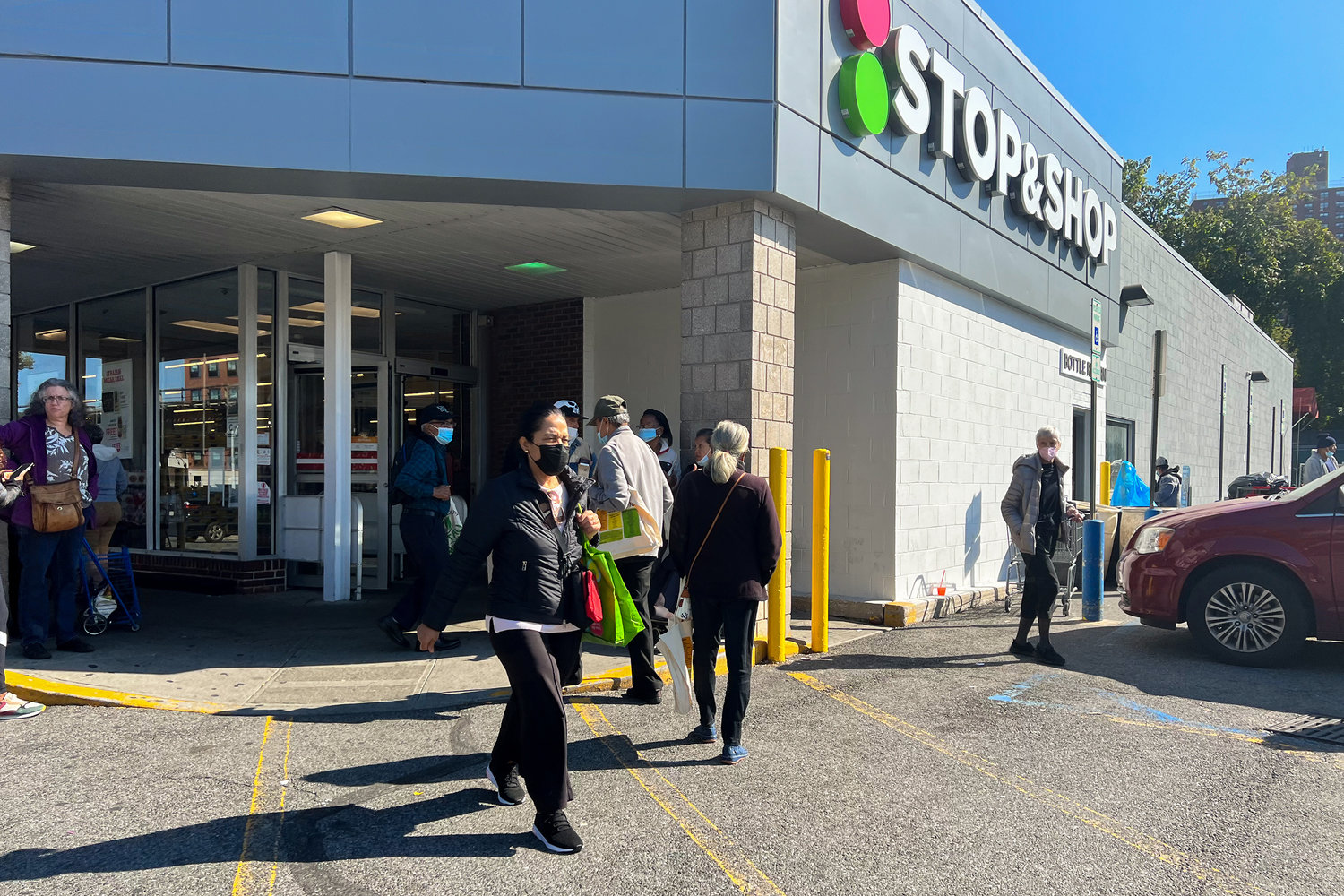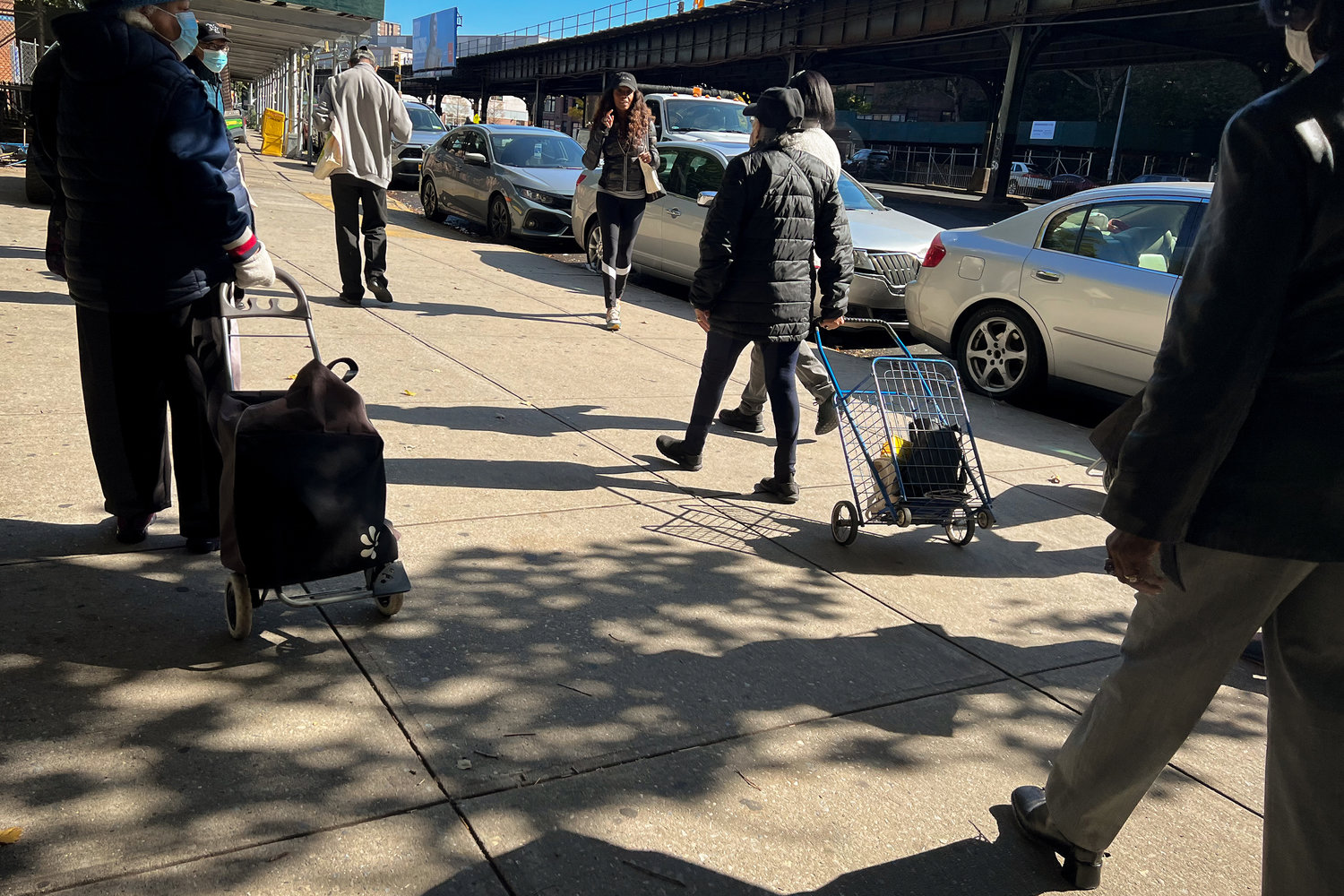Senior citizens take first steps toward healthy eating
Older adults struggling to read nutrition labels learn from market trip
If there is anything Cecilia Santana and Rosa Ogando learned during their recent senior center field trip to neighborhood grocer Shop & Stop, it is about living a healthier lifestyle.
Ogando recently began shopping in the fruit and vegetable department at the supermarket rather than making her way to the middle of the store, where sodium literally “sits” in manufactured cans.
They were part of a group of 18 others from the senior center led by the Riverdale Senior Services Healthy Community Initiative team members.
RSS began a program aimed at older adults in the hope of educating them on healthy eating. Their studies show that older adults don’t eat or exercise correctly as their doctors might prescribe.
Santana said that due to social distancing required during the pandemic, many programs closed in the northwest Bronx for exercising and healthy eating.
Some never re-opened. So, Santana tries to find different ways to stay healthy.
That is until she heard of Walk and Shop.
“The project is working to empower older adults to improve health outcomes through health management and education workshops,” said Margie Schustack, director of communications at RSS.
Walk and Shop is not new. The previous program event was at Kingsbridge Heights Community Center.
The way the program works is basically an event where the group walks with a nutritionist to Stop & Shop. During the store tour, they discuss the importance of reading labels and eating fruits and vegetables.
Some older adults have limited access to fresh produce and a lack of knowledge about healthy eating. That usually leads to seniors health getting worse, Schustack explained.
A recent survey from RSS shows that 65 percent of the people aged 70-89 years old receive food from the pantries at Marble Hill and Kingsbridge Heights. Twenty-two percent of those people also have a form of diabetes and high blood pressure.
Yet, the only issue is the language barrier.
“We don’t know how to shop, a lot of our food has a lot of salt, we have trouble reading labels,” Ogando said.
However, Isael Tejeda — the spearhead of the program — community engagement coordinator at RSS claims that it might be Ogando’s opinion, but it happens a lot.
“Oftentimes when they go shopping, they don’t read the marketing part, the (nutrition facts) labels,” he said.
Many of the Marble Hill Senior Centers have a Hispanic and Latino demographic and are monolingual Spanish speakers.
Tejeda coordinated the event to be culturally relevant in that it somewhat serves as a workshop. The 20 residents are not required to purchase what was demonstrated.
As the program demonstrates to seniors what to eat, they get a discount in it too. Shop & Stop supplies an individual $10 coupon for anything in the store.
People like Ogando and Santana, who might spend $10 each, will be expected to pay the price difference if the amount goes over.
They were led by a woman with many titles. But to greater Riverdale residents, Deborah Johnson is known as the community nutritionist, health coach and consultant of RSS.
“I’m really excited about today! But remember, walk at your own pace,” Johnson said to her group prior to leaving the main base for Marble Hill Senior Center at 5365 Broadway.
The walk was roughly one mile, a straight path, and lasted 20 minutes.
Johnson told The Riverdale Press that many — but not most of the members suffer from hypertension and diabetes. She is there to teach them what is bad sugar and what is too much salt.
Walking five days a week and incorporating 20 minutes of walking into their lifestyle can lower blood pressure and manage other conditions they might have concerns about.
“We are going to talk about vegetables today, so we will spend the majority of our time in that aisle,” she said during the event.
“We will be in the produce aisle and talk about foods that are high in potassium.”
Foods rich in potassium are important in managing high blood pressure because it lessens sodium.
Typically Johnson and Tejeda would begin with the dairy and bread.
However, for this trip, they stayed in the fruit department.
There Johnson described the correct way to wash fruits that might be touched with pesticides. Blueberries and other berries should be triple-washed or soaked in water.
“I didn’t know much about that before,” Santana said. “But I do now, it’s something to think about.”
It is even better if they try to find the word “organic”, although it might be a few dollars more.
Pesticides do not wear off quickly. According to an environmental group, 70 percent of non-organic fresh produce are potentially harmful pesticides.
Johnson explained the different foods the group normally would eat that are high in potassium. Items include spinach, broccoli, kiwis, bananas, melons, dry beans and lentils.
“I love beans and lentils,” Johnson said.
She explained studies have found that the more plant-based products a person consumes the more it helps with blood pressure.
Ogando, who is of Spanish descent, relies on her culture’s famous cuisine of rice and beans.
However, according to Johnson, canned beans should be avoided since they are filled with sodium to preserve the beans.
During the lesson, not only was the Marble Hill group interested, but other shoppers also stopped to listen. They even asked their own questions.
But only people who were signed up were allowed to participate. The group plans on going on the trip on Tuesday, Nov. 1.
“Supermarkets are now changing, bringing in more organic stuff, they have calendars with fruits and vegetables on them,” Santana said.
“My family isn’t here, but they want me to eat healthier and quality food,” she said.
“They say ‘now is the time to sort out all those issues with the quality of life, so luckily, I’m doing OK.”











